|
The future of cancer treatment lies in a personalized approach to diagnostics
Happy Saturday, friends!
We're back in the States and headed to the midwest and the east coast for some big conferences. First, we'll be travelling to Chicago to attend the North American Spine Society's NASS 2015 Conference October 14-16. Next, we'll hop over to Boston for the ASPS's Plastic Surgery (THE MEETING) 2015 Conference on the 17th. Let us know if you will be out that way, too!
THIS ISSUE'S HIGHLIGHTS:
1. The Future of Cancer Diagnostics:
How advanced molecular techniques, specialized fluorescence applications, and re-establishment of tumor microenvironments within a lab setting are paving the way for personalized medicine. An overview of past and current cancer diagnostics techniques as well as new research by Dr. Danny Enepekides and members of the Lattice Biologics team.
3. Welcome to Dr. Enepekides: Get to know the newest member of our Scientific Advisory Board, Dr. Danny Enepekides, BSc, MDCM, MPH, FRCSC, the Chief of Surgical Oncology for the second largest Cancer Centre in Canada and Associate Professor of Otolaryngology - Head and Neck Surgery at the University of Toronto whose research is featured in this issue's Cancer Diagnostics article.
Guy Cook,
CEO
Lattice Biologics Inc.
|
 |
|
Mirror Image: The future of cancer diagnostics may be closer than it appears 
Advanced
molecular techniques, fluorescence,
and reconstruction of the tumor microenvironment
Those who have faced cancer firsthand know all too well how harrowing the process can be from diagnosis throughout treatment and hopes for remission. We believe personalized medicine offers a much better path and, through the intensive research of our partners, we are working to make it a reality.
Learn about the new methods of diagnostics being developed and how precision medicine can prevent patients from having to endure the standard guess-and-check "guinea pig" approach to treatment.
Click here to view our cancer diagnostics slideshow.
|
 |
Update on Lattice's Merger with Blackstone Ventures
October 8, 2015

Lattice Biologics Inc. is pleased to announce that Blackstone Ventures Inc. (TSX
-
V: BLV), a company listed on the TSX Venture Exchange, has received funding of CDN$1.37 million in connection with its proposed acquisition of Lattice. We previously announced transaction with Blackstone was previously in our August 13, 2015 news release.
In connection with the transaction, Blackstone advanced CDN$550,000 of the Proceeds to Lattice as a unsecured working capital loan. Lattice proposes to use the proceeds from the loan to pay outstanding accounts payable, purchase and service inventory, and fund general working capital requirements.
"The entire Lattice team joins me in expressing our wholehearted enthusiasm for the latest update on our near-term merger with Blackstone Ventures. This funding infusion is the direct result of nearly two years of focused clinical research and product development, thoughtful partnerships with the world's most respected surgeons, carefully cultivated alliances with financial experts, and scientific and business tours across the globe."
"Witnessing the contributions of the medical, technical, and financial team members who have made this achievement possible, I am thoroughly humbled by their commitment to and collaboration in our most meaningful goals."
- Guy Cook, Chief Executive Officer,
Lattice Biologics Inc.
|
 Lattice Welcomes Lattice Welcomes
Dr. Danny Enepekides, New Scientific Advisory Board (SAB) Member!
Lattice Biologics is honored to announce the addition of Dr. Danny J. Enepekides, BSc, MDCM, MPH, FRCSC, Chief of Surgical Oncology for the second largest Cancer Centre in Canada and Associate Professor of Otolaryngology - Head and Neck Surgery at the University of Toronto, to our SAB. This renowned surgeon is based in Toronto and has studied and practiced in both the United States and Canada.
Dr. Enepekides is highly regarded by medical professionals and patients, alike, for his immense surgical talents and record of success with difficult procedures as well as his extremely personable and compassionate approach to patient care. He has devoted considerable resources to research and educates future surgeons through his work at the University of Toronto. Dr. Enepekides has published over 45 peer-reviewed publications, written multiple book chapters, and served as the reconstructive sectional editor for Current Opinion in Otololaryngology - Head and Neck Surgery.
Dr. Enepekides' appointments and affiliations include:
- Chief of Surgical Oncology - Odette Cancer Centre, Sunnybrook Health Sciences Center
- Regional Lead of Surgical Oncology - Cancer Care Ontario
- Attending Surgeon - Sunnybrook Health Sciences Center
- Associate Scientist - Sunnybrook Health Sciences Center
- Associate Professor of Otolaryngology - Head and Neck Surgery - University of Toronto
- Chair of Quality & Safety Committee, Otolaryngology, Faculty of Medicine - University of Toronto
- Head and Neck Disease Site Group Member, Head Office - Cancer Care Ontario
Dr. Enepekides' Research Foci includes:
- Diagnosis and care of malignancies of the thyroid and parathyroid
- Reconstructive surgery of the head and neck
- Molecular biology of squamous cell carcinoma
Professional Associations:
- Canadian Society of Otolaryngology - Head and Neck Surgery
- American Academy of Otolaryngology - Head and Neck Surgery
- American Head and Neck Society
- Royal College of Physicians and Surgeons of Canada
- AOCMF
Select Publications:
"Upper and lower eyelid reconstruction: the year in review." Current Opinion in Otolaryngology - Head and Neck Surgery 14(4)
"Concurrent chemoradiotherapy as the most appropriate treatment for most T3 laryngeal carcinomas." Arch Otolaryngol Head Neck Surg. 131(9)
"Sinonasal undifferentiated carcinoma: an update." Current Opinion in Otolaryngology - Head and Neck Surgery 13(4)
"Recent advances in the treatment of juvenile angiofibroma." Current Opinion in Otolaryngology - Head and Neck Surgery 12(6)
"Giant juvenile nasopharyngeal angiofibroma: management by skull base surgery." Arch Otolaryngol Head Neck Surg. 130
"Transoral approaches to the clivus and nasopharynx." Otolaryngol Clin North Am. 34(6)
"Management of congenital anomalies of the neck." Facial Plastic Surgery Clinics of North America 9(1)
"Regulation of gene expression by 1 alpha, 25-dihydroxyvitamin D3 and its analog EB1089 under growth-inhibitory conditions in squamous carcinoma cells." Mol Endocrinol. 15(7)
"Long-term outcomes of anterior skull base surgery." Current Opinion in Otolaryngology - Head and Neck Surgery 8
"Occult cervical metastases: immunoperoxidase analysis of the pathologically negative neck." Otolaryngology - Head and Neck Surgery 120(5)
"The independent and combined effects of RAR-, RXR-, and VDR-selective ligands on the growth of squamous cell carcinoma in vitro." Journal of Otolaryngology - Head & Neck Surgery 28(2)
Background and Professional Distinctions:
After completing his Otolaryngology residency at McGill University, Dr. Enepekides completed two and a half years of fellowship training in Head and Neck Oncology and Microvascular Reconstructive Surgery at the University of California-Davis and Hahnemann University in Philadelphia. He then assumed the position of Associate Director of the Division of Head and Neck Surgery at the University of California - Davis. After 8 years in the United States, Dr. Enepekides returned to Canada and joined the University of Toronto's department of Head and Neck Surgery in 2007. He is currently the Chief of Surgical Oncology at the University of Toronto's Odette Cancer Center. Dr. Enepekides continues to serve as a member of the American Head and Neck Society's Advanced Training Council.
What His Patients Say:
"Dr. Enepekides is the most caring and considerate doctor I have ever encountered. He saved my life by performing surgery for my thyroid cancer. He was very thorough and very kind in explaining what was happening to me and the next steps. Although he performed two surgeries within four months' time in the same neckline, the scar is non-existent. I will miss seeing him."
"Dr. Enepekides is an outstanding surgeon. He operated on my husband who had a tumor in his parotid gland. He spent a lot of time explaining the complicated surgery. He was honest but very caring and kind. We knew of his great credentials but were thrilled with his bedside manners. He even took into consideration my husband's line of work when doing the nerve, muscle, and skin grafts! I believe God put us with the best."
Welcome, Dr. Enepekides!
|
 |
 Wine and Cancer Prevention: Wine and Cancer Prevention:
Truth or Fiction? 
Lattice Biologics separates the scientific truth of wine's wellness wonders from wishful thinking
You might have heard that wine is good for the heart or that it can help prevent cancer (not to mention a variety of mental and emotional meltdowns!). As much as those of us who enjoy the beverage hope that's the case, can we count on it?
The big player in the chemistry of wine and wellness is resveratrol.
Resveratrol is a polyphenolic (
micronutrient, with evidence linking it to the prevention of degenerative diseases such as cancer and cardiovascular diseases)
compound naturally found in grapes, red wine, grape juice, peanuts, cocoa, and berries of Vaccinum species (blueberries, bilberries, and cranberries).
 To get to the bottom of the glass, we turned to The Linus Pauling Institute (named for the famed activist, scientist, and "founding father of molecular biology") Micronutrient Information Center. They have the following to say about this potentially potent polyphenolic compound: To get to the bottom of the glass, we turned to The Linus Pauling Institute (named for the famed activist, scientist, and "founding father of molecular biology") Micronutrient Information Center. They have the following to say about this potentially potent polyphenolic compound:
Biological activities related to cancer prevention:
Inhibition of proliferation and induction of apoptosis: Following
DNA
damage, the cell cycle can be transiently arrested to allow for DNA repair or activation of pathways leading to cell death (
apoptosis
) if the damage is irreparable... Resveratrol has been found to induce cell cycle arrest and/or apoptosis (programmed cell death) in a number of cancer cell lines.
Inhibition of tumor invasion and angiogenesis:
Cancerous
cells invade normal tissue aided by
enzymes
called
matrix metalloproteinases
. Resveratrol has been found to inhibit the activity of at least one type of matrix metalloproteinase. To fuel their rapid growth, invasive tumors must also develop new blood vessels by a process known as
angiogenesis
. Resveratrol has been found to inhibit angiogenesis
in vitro
and
in vivo
. (There was no position regarding "in vino.")
Read on for the rest of the "Wine Wellness" story in the column to the right.
Enjoy more fun vino facts in the column on the right!
|
What's next? Have a burning biological question you want answered? Email us!
|
|
|
|
|
THIS ISSUE'S FUN FACT: Beyond Fermentation - Savor the Wine Science
|
 |
METABOLOMICS - WINEMAKERS RELY ON HIGH-TECH TESTING FOR PERFECTION
Due to an increased understanding of vino-chemistry, the age-old process of winemaking has made a sharp departure from the its original art form to embrace modern science.
Makers today recognize that wine "contains hundreds of volatile and non-volatile compounds that influence its flavor." Most of these chemicals are not even present in the starting ingredients, but develop throughout the fermentation and aging process.
In order to harness wine's flavor potential, wine-makers have begun to adopt
analytical chemistry and biochemistry technologies for their work.
These include: mass spectrometry (MS) and nuclear magnetic resonance (NMR) which are used to identify the complexities of wine's chemical components which impart each particular flavor.
Metabolomics is "the study of the total chemical composition of biological materials."
Tools for Wine Metabolomics: gas chromatography-coupled mass spectrometry (GC-MS), liquid chromatography-mass spectrometry (LC-MS), and NMR.
Each metabolomics method detects just a small portion of the metabolome-volatiles present so researchers must often combine some or all methods to achieve the most comprehensive understanding of the profiles.
|
|  Source: Perkel, Jeffrey M., Ph.D. "Finding Flavor in Food" BioTechniques 58:8-12 (January 2015) doi 10.2144/000114244 Source: Perkel, Jeffrey M., Ph.D. "Finding Flavor in Food" BioTechniques 58:8-12 (January 2015) doi 10.2144/000114244
|
|
TO PEPPER,
OR NOT TO PEPPER?
|
 |
My favorite way to order a glass of wine at dinner is to ask the restaurant to recommend their most "peppery" red. If you're like me, it's all about that spicy little kick. But there's surprising science behind the reason some people never request a glass of the peppery stuff.
Upon extensive investigation into the chemicals that give some Australian Shiraz wines their characteristic black pepper aroma, Markus Herderich and his team at the Australian Wine Research Institute ultimately identified a particular sesquiterpene (a class of terpenes, which are a type of plant-based organic compound) called rotundone as responsible for the signature flavor.
They also discovered that while the majority of their panelists could detect rotundone in "as little as 8 ng/L in water," 20% of them couldn't identify it even at a 500 times greater concentration. The big surprise is that almost a quarter of all people are nearly anosmic for rotundone, meaning they lack the ability to smell it at all. This could be part of the reason why two people can sample the same wine and have completely different interpretations of its taste.
As it turns out, taste in wine is not just personal, it's biological.
|
|
RUINED WINE'S PHANTOM STINK
|
 |
Have you ever opened a beautiful, old bottle of wine with great anticipation - only to be met with an awful, dank basement, mildew stench upon popping the cork?
That unpleasant odor scent tells you the bottle has succumbed to the much maligned "cork taint." The chemical at fault for the ruined bottle of wine, 2,4,6-Trichloroanisole (TCA), "occurs when natural cork fungus inadvertently contacts chlorine cleaning products during wine bottling." But, unlike other foul-smelling chemicals, TCA knocks out the nose's scent receptors instead of engaging them. So, while it seems like you're smelling something terrible, your nose is actually being "numbed."
But that doesn't make much "scents." (get it?) Osaka University's Hiroko Takeuchi and colleagues determined that TCA knocks out our olfactory receptors' electrical signals, rather than stimulate them. So, what you think you are "smelling" when you experience cork taint is really just a sense of numbness of your scent receptors.
While researchers are still unclear as to why the compound that numbs our sense of smell also simultaneously gives us the impression of smelling something foul and musty, they do conclude that the reduction of activity in scent-sensing cells "may induce some kind of pseudoolfactory sensation" or "phantom smell."
The good news for most of us is that modern day winemakers are aware of TCA and have removed chlorine cleaning products from their bottling process, which means that the nasal assault of cork taint will only be a potential problem for those with their hands on older vintages. And we don't feel too sorry for those folks, anyway!
|
|
WINE & WELLNESS cont. THE RESEARCH
|
|
"Although resveratrol can inhibit the growth of cancer cells in culture and in some animal models, it is not known whether resveratrol can prevent and/or help treat cancer in humans.
The presence of resveratrol in red wine was initially thought to be responsible for red wine's beneficial cardiovascular effects. Two randomized, placebo-controlled trials reported that one-year consumption of a grape supplement containing 8 mg/day of resveratrol improved inflammatory and atherogenic status in subjects at risk for cardiovascular disease, as well as in patients with established coronary heart disease."
|
|
THE GOOD NEWS
&
THE BAD NEW
|
"Resveratrol administration has increased the lifespans of yeast, worms, fruit flies, fish, and mice fed a high-calorie diet, but it is not known whether resveratrol will have similar effects in humans."
(This might explain some of the reason fruit flies - the nasty bane of summertime wine drinkers everywhere - are so insistent at dive bombing my cabernet...)
|
"Experimental animal studies have suggested that resveratrol might be neuroprotective and be beneficial in the prevention and/or treatment of neurodegenerative diseases; however, clinical trials in healthy or cognitively impaired older people are currently very limited."
(This seems like important research. Are there any volunteers out there interested in furthering this data??)
|
THE BOTTOM LINE:
W IS FOR "WHY NOT?"
|
While the research is far from conclusive, that glimmer of hope is a good enough reason for us to savor a little fine wine with friends whenever we get the chance. Until the next time, we raise a glass to YOU!
|
SHARE THE WORD

Know someone who might be interested in our regenerative and personalized medicine updates?
Click to share this newsletter with your team, colleagues, and contacts.
|
| 
If you have received this newsletter from a friend, click the box above to sign-up and receive your own updates. |
GET TO KNOW LATTICE

Lattice Biologics Inc. is an emerging leader in the field of cellular therapies and tissue engineering, with a focus on bone, skin, and cartilage regeneration.
We develop, manufacture, and market biologic products to domestic and international markets. Our products are used in a variety of applications, including: Enhancing fusion in spine surgery Enhancing breast reconstruction post mastectomy for breast cancer patients Sports medicine indications, including ACL repair Promotion of bone regeneration in foot and ankle surgery Enhancing wound repair in burn victims Subchondral bone defect repair in knee and other joint surgeries
Contact us today to learn more about our products and technologies.
Click here to download our Executive Summary.
|
|